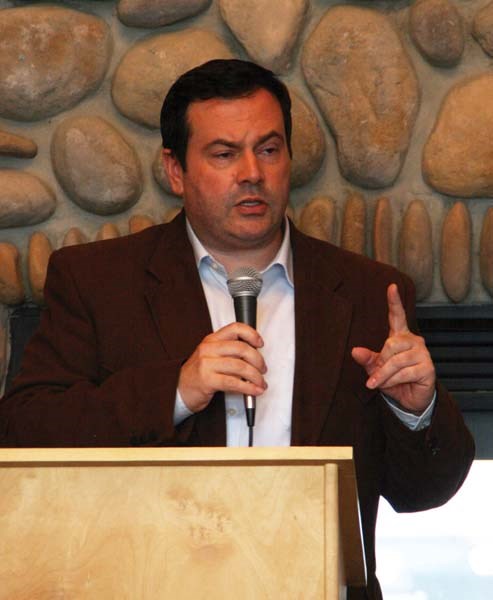Federal Minister of Immigration, Jason Kenney, hopes labour shortages in the Bonnyville - Cold Lake region may start to improve thanks to recent changes to Canada's immigration system and temporary foreign worker program.
The ever-expanding oil and gas industry in the area is growing at a rate where job opportunities are arising faster than employers can fill them.
Highly skilled trade jobs such as welder, heavy duty mechanic and carpenter, are remaining vacant but a new pilot program for skilled temporary foreign workers announced on July 16, could help solve that issue said Kenney during his visit to Bonnyville on July 18.
"We're moving from what was a slow, passive and rigid system with declining economic results and lower levels of employment and income for immigrants and huge shortages in parts of our economy, to a system that is fast, flexible and responsive to the labour market," declared Kenney.
Essentially the program will enable employers to recruit skilled trade workers in high demand from visa exempt countries, fly them to airports in Edmonton and Calgary and have an immigration officer stamp a work permit into their passports. The work permit is valid for two years and is good for any employer in the sector for which they were hired.
"This collapses what was a six or seven month bureaucratic process into a 30-minute process at the airport," explained Kenney. "It really says to employers you now have (a) light at the end of the tunnel when it comes to meeting the labour demands, especially for major construction projects."
Residents of the area who attended the meeting recognized the potential short term advantages of the program but brought up concerns about whether or not a pilot program will solve labour shortage issues in the long run in an industry that shows no signs of slowing down. Kenney, however, defended the government's decision explaining that changes like this must be done carefully.
"It's a one year pilot and if it's abused or if the economy goes soft again, we reserve the right to shut down the program," said Kenney. "We always have to do these things carefully and prudently. We don't want to open the flood gates without making sure Canadians are getting the jobs first."
The pilot program is consistent with a number of new reforms to Canada's immigration system which will be more focused around developing the Canadian economy. Kenney explained the new system will focus on getting highly skilled immigrants who have had extensive training in their home countries out of the driver's seat of a cab and into skilled positions that need to be filled.
"We created more flexibility in our foreign worker program but...we are (also) reforming fundamentally our immigration system to get more skilled people into this economy doing the jobs that are unfilled right now," clarified Kenney. "We don't need immigrant engineers driving cabs in Toronto and Vancouver, we need more petroleum engineers at Esso...we need more people actually filling the jobs that are going unfilled in areas of Canada like the Bonnyville - St. Paul region."
Under the new system, the federal government will be conducting pre-assessments of the credentials of foreign trained professionals who are hoping to come to Canada and work in their profession. The pre-assessments allow the government to hand-pick trained individuals who are relevant to the Canadian labour market but will also allow them to provide information regarding any upgrading that may be required of an immigrant upon arrival, to get hired in their area of expertise.
In order to make the process of credential recognition easier and more efficient, Kenney explained they are working hard to move from a provincially specific standard to a more national standard.
"In 2009, the prime minister got an agreement amongst all premiers to come up with a national approach to come up with a faster and simpler recognition of foreign credentials," said Kenney. "What we're practically doing is...saying, 'We want you guys to hammer out a common Canadian, simple, straightforward national standard.'...The whole system becomes simpler...the objective is to give applicants an answer within a year."
As for those foreign trained immigrants already in Canada who are looking to upgrade, Kenney said the department has started partnering up with non-profit organizations like the Alberta Immigrant Access Fund to provide foreign-trained immigrants with small loans to assist them in getting the training they need.
"Many of these foreign trained professionals come and they immediately have to go into a survival job to feed their families," said Kenney. "This is why we have also started working with non-profit organizations like the Alberta Immigrant Access Fund, which we are funding, to provide for micro-loans up to $10,000 for foreign trained professional immigrants to help them pay for supplementary courses, diplomas, education and certification exams to give them that little bit of financial boost."
Despite concerns from the public, Kenney remains optimistic the federal government is moving in the right direction.
"How do we have fewer people underemployed as immigrants and more immigrants coming directly in to fill acute shortages in our economy? That's what our new immigration system is designed to do. You will see a lot of those shortages being filled on a permanent basis through our new immigration system."



